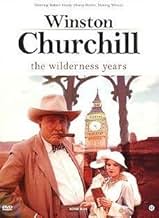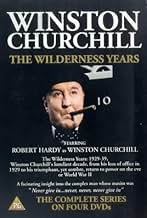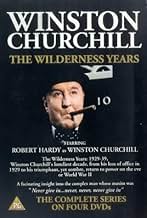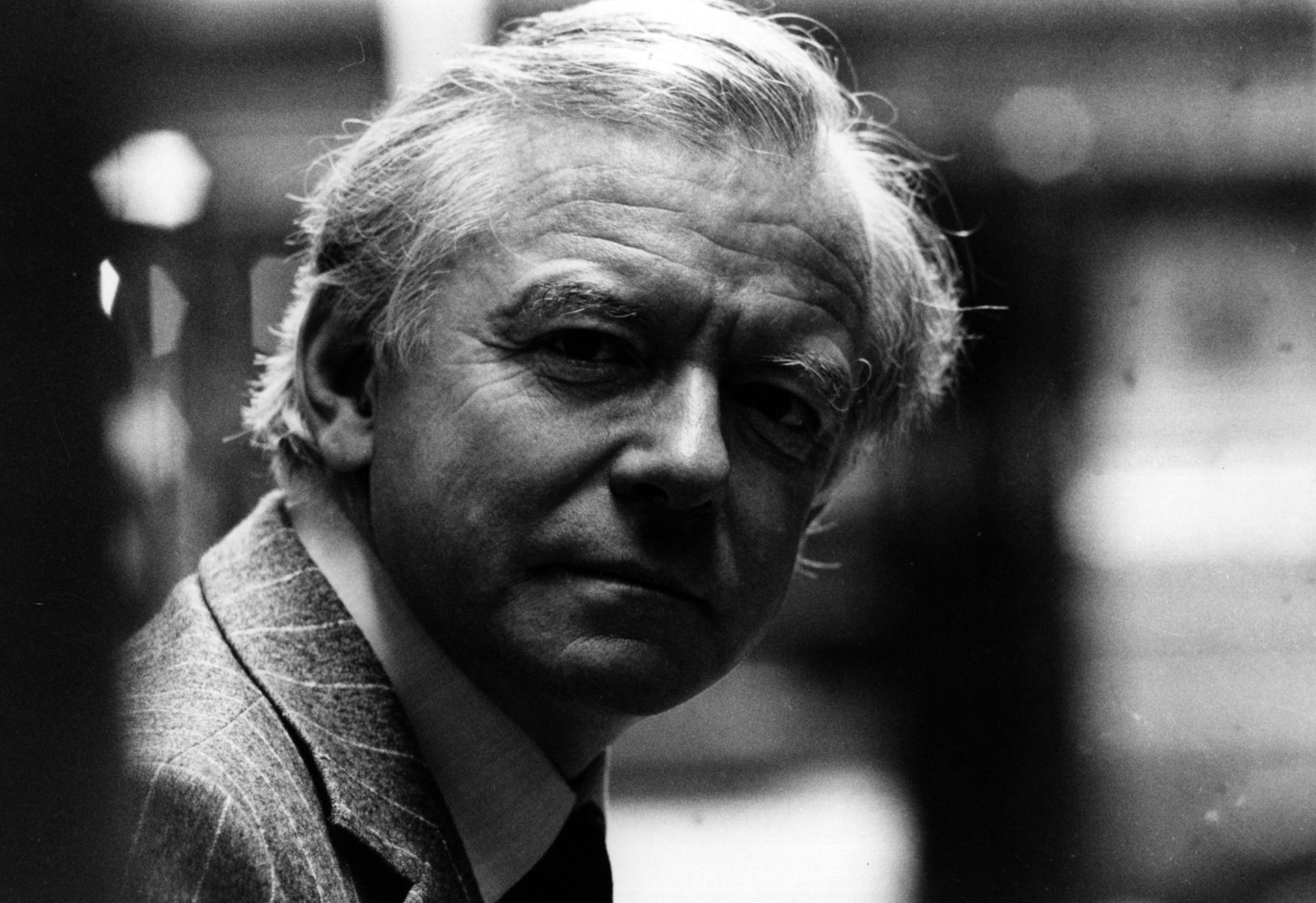IMDb RATING
8.4/10
355
YOUR RATING
The story of Winston Churchill's life between 1929, when he lost his cabinet position, and 1939, when he joined Great Britain's War Cabinet - a period he described as the most difficult in h... Read allThe story of Winston Churchill's life between 1929, when he lost his cabinet position, and 1939, when he joined Great Britain's War Cabinet - a period he described as the most difficult in his life.The story of Winston Churchill's life between 1929, when he lost his cabinet position, and 1939, when he joined Great Britain's War Cabinet - a period he described as the most difficult in his life.
- Nominated for 8 BAFTA Awards
- 1 win & 8 nominations total
Browse episodes
Featured reviews
Very accurate telling of Churchill's life while out of office and his struggle to warn the UK of the Nazi peril. Hardy puts his soul into it, though he comes off as whiny or pouting at times rather than as the British bulldog Churchill was. Fascinating stuff!
Great performance from Robert Hardy, also Sian Phillips as stoical Clementine, Nigel Havers as impecunious son Randolph, Tim Piggot-Smith as Churchill cheerleader Brendan Bracken, Peter Barkworth as wily Stanley Baldwin, Eric Porter a trusting Neville Chamberlain, Edward Woodward a devious Samuel Hoare, Tony Mathews an intense Anthony Eden. Only Richard Murdoch's hawkish, almost Churchillian Lord Halifax is completely off beam, presumably to make it easier to cast Chamberlain as villain of the piece.
There are no bad episodes, it dipped slightly in the third and fourth which mostly concerned India and cotton, rather a distraction from the main theme. My favourite, very amusing, scene is in the first episode. Chamberlain, supported by Hoare, tries to persuade Baldwin to remove Churchill from the Treasury. Baldwin slyly asks Chamberlain "who would you most like to see as Chancellor", to which he could only reply that he hasn't given the matter a great deal of thought. An honest answer could only have been himself.
My only criticism is about some of the later dialogue, which displays the oft used device of portraying people in black and white for dramatic effect. I must declare a family connection with Chamberlain, my grandfather knew him well and was his chief canvasser in the 1920s. Did he really say (episode 5) "Churchill is the warmonger, not Hitler"? His statement (episode 7) that "I'm instructing the defence services to continue to reduce their estimates" is tendentious fiction. Military spending rose every year from 110.9 million Pounds in 1933 to 266 million in 1939.
However harshly films and television treat Baldwin and Chamberlain, one can bet all Lombard Street to a China orange (excuse my 1930s lingo) that Labour's record is shown in a good light or glossed over. In March 1936 Labour opposed increases in armaments, their amendment to the budget decried "security in national armaments alone and intensifies the ruinous arms race between the nations" Well known Labour figures voting for this amendment included Attlee, Bevan, Dalton, Greenwood, Morrison, Shinwell. I just thought I'd mention it in the interests of balance.
There are no bad episodes, it dipped slightly in the third and fourth which mostly concerned India and cotton, rather a distraction from the main theme. My favourite, very amusing, scene is in the first episode. Chamberlain, supported by Hoare, tries to persuade Baldwin to remove Churchill from the Treasury. Baldwin slyly asks Chamberlain "who would you most like to see as Chancellor", to which he could only reply that he hasn't given the matter a great deal of thought. An honest answer could only have been himself.
My only criticism is about some of the later dialogue, which displays the oft used device of portraying people in black and white for dramatic effect. I must declare a family connection with Chamberlain, my grandfather knew him well and was his chief canvasser in the 1920s. Did he really say (episode 5) "Churchill is the warmonger, not Hitler"? His statement (episode 7) that "I'm instructing the defence services to continue to reduce their estimates" is tendentious fiction. Military spending rose every year from 110.9 million Pounds in 1933 to 266 million in 1939.
However harshly films and television treat Baldwin and Chamberlain, one can bet all Lombard Street to a China orange (excuse my 1930s lingo) that Labour's record is shown in a good light or glossed over. In March 1936 Labour opposed increases in armaments, their amendment to the budget decried "security in national armaments alone and intensifies the ruinous arms race between the nations" Well known Labour figures voting for this amendment included Attlee, Bevan, Dalton, Greenwood, Morrison, Shinwell. I just thought I'd mention it in the interests of balance.
Have to agree with everything that the others have said before me. This is a superb, outstanding drama and the kind of thing that good modern history lessons should be built around in school. One or two others have described it as flawless - I agree: and some of the dramatic touches added by the lighting are almost genius. One thing that some people may not know is that some of it - particularly some of the outdoor scenes but also I suspect, some appropriate indoor scenes - were shot at Chartwell, Churchill's country house which is preserved for the public and has a warm and friendly, home "family" atmosphere. And yes, Churchill did indeed get a kick out of building a wall or two there, as well as painting some interesting pictures - his art is much more highly regarded by the critics than Hitler's!!
10mc3852
This mini-series is truly a classic, the best historical drama that I have ever seen. There are slow spots whenever the action moves away from Churchill, or else the mini-series travels over-familiar territory like German preparations for World War II, but these points are simply quibbles. You literally hear the clash of arms, the ring of combat and the roars of the crowd as Churchill battles one foe after another, often defeated but never giving up. I swear, this movie will give you chills with the sense of history being made.
PBS broadcast the mini-series in 1986. Drew Middleton, a WWII correspondent, said that it had the force of Greek tragedy, Churchill the antagonist while everyone--friends, family, political opponents--became part of the chorus. Robert Hardy performs that role magnificently. He has done good work in "Middlemarch", "Elizabeth R" and "All Creatures Great and Small", but those roles are simply dwarfed by his Churchill. Alternately raging, noble, petty-minded, sulking, humorous, sly and generous, Hardy's Churchill is a character of Shakespearean proportions. Rarely does an actor match the emotional force of an historical giant, but Hardy succeeds. Over eight hours, Hardy is never dull.
Still, a great hero is nothing without opposition. When Hardy did a one-man show of Churchill, I was terribly disappointed. Hardy was still doing what he did before but, without context and response, his performance seemed little more than a recital of greatest hits. It is really the entire cast, uniformly excellent, that lifts this mini-series above the usual attempt at history. Nigel Havers does an entertaining and ultimately tragic performance as Randolph, Churchill's beloved son, who is already being ruined by his father's indulgence and overblown expectations. Peter Barkworth as Samuel Baldwin is the ultimate politician, ever so slyly maneuvering with one honest insincerity after another so that, through a bewildering series of missteps that no one but he can understand, he gets exactly what he wants. But Churchill's greatest opponent is Neville Chamberlain. Eric Porter plays him full of arrogance and incomprehension, already marked by the flaws which Hitler will brilliantly exploit. Yet the gradual breakdown, his ultimate realization that his best efforts have led to nothing but ruin, gives Chamberlain a measure of tragic dignity that makes him sympathetic despite the historical record. Churchill is a triumphant Henry V, but Porter plays the blinded hero of his own Greek tragedy to perfection.
An aside. The opening and closing music of this mini-series matches with the greatest music ever made for the movies. Starting mysteriously dim and obscure, it swells into a mighty torrent of sound and victory, at once enthralling to the ear and a perfect encapsulation of the mini-series. If Churchill had had a taste for such music, he would have loved it. Comparable to Strauss' "Thus Spake Zarathustra" but infinitely better, the theme music really conveys the character of Churchill and of the times.
PBS broadcast the mini-series in 1986. Drew Middleton, a WWII correspondent, said that it had the force of Greek tragedy, Churchill the antagonist while everyone--friends, family, political opponents--became part of the chorus. Robert Hardy performs that role magnificently. He has done good work in "Middlemarch", "Elizabeth R" and "All Creatures Great and Small", but those roles are simply dwarfed by his Churchill. Alternately raging, noble, petty-minded, sulking, humorous, sly and generous, Hardy's Churchill is a character of Shakespearean proportions. Rarely does an actor match the emotional force of an historical giant, but Hardy succeeds. Over eight hours, Hardy is never dull.
Still, a great hero is nothing without opposition. When Hardy did a one-man show of Churchill, I was terribly disappointed. Hardy was still doing what he did before but, without context and response, his performance seemed little more than a recital of greatest hits. It is really the entire cast, uniformly excellent, that lifts this mini-series above the usual attempt at history. Nigel Havers does an entertaining and ultimately tragic performance as Randolph, Churchill's beloved son, who is already being ruined by his father's indulgence and overblown expectations. Peter Barkworth as Samuel Baldwin is the ultimate politician, ever so slyly maneuvering with one honest insincerity after another so that, through a bewildering series of missteps that no one but he can understand, he gets exactly what he wants. But Churchill's greatest opponent is Neville Chamberlain. Eric Porter plays him full of arrogance and incomprehension, already marked by the flaws which Hitler will brilliantly exploit. Yet the gradual breakdown, his ultimate realization that his best efforts have led to nothing but ruin, gives Chamberlain a measure of tragic dignity that makes him sympathetic despite the historical record. Churchill is a triumphant Henry V, but Porter plays the blinded hero of his own Greek tragedy to perfection.
An aside. The opening and closing music of this mini-series matches with the greatest music ever made for the movies. Starting mysteriously dim and obscure, it swells into a mighty torrent of sound and victory, at once enthralling to the ear and a perfect encapsulation of the mini-series. If Churchill had had a taste for such music, he would have loved it. Comparable to Strauss' "Thus Spake Zarathustra" but infinitely better, the theme music really conveys the character of Churchill and of the times.
This series was a wonderful and unexpected one a quarter century ago. Based on a book of the same name, it traced the missing period of Winston Churchill's career. Having been a leading figure in political life from 1903 to 1929, and risen to such posts as Home Secretary, First Lord of the Admiralty, and Chancellor of the Exchequer, Churchill was cast adrift when the Tories under Stanley Baldwin lost office to the Labor Party of Ramsay MacDonald in a general election. For awhile Baldwin and Churchill were sitting next to each other on the front opposition bench in the House of Commons, but Baldwin was not that happy about this. He knew that Churchill was a potential Tory rival for leadership, and Baldwin wanted to control those who would succeed him while he held power.
The series did not quite explain Churchill's weakness here - in 1903, when he first made his name in politics, Churchill was a Tory M.P. This was traditional, because his father, Lord Randolph Churchill, had also been a Tory M.P. But Lord Randolph had been a maverick, who built up a block of Tories (one was future Prime Minister Arthur Balfour) called the Fourth Party, and had done considerable damage to Lord Salisbury's party in the 1880s. Lord Randolph did end up as Chancellor of Exchequer in 1887, but a political showdown miscalculation with Salisbury finished his career (a case of syphilis also ruined it). Winston took his father's independence to heart. He announced his rejection of the Tory policies of his day, and "crossed the aisle" to sit with the Liberal Party. Denounced for his treason to his father's party, Winston actually rose to power from 1903 to 1923 as a Liberal Party leader. But in 1916 there was a power struggle between the Liberal Prime Minister (Asquith) and his successor (Lloyd George). Winston sided with Lloyd George, and this was fine while a complicated half-Liberal/half-Tory coalition existed. But it collapsed in 1922. The following year Winston announced his disillusion with Liberal Party politics and crossed back to the Tories. Baldwin accepted it, as Churchill was experienced and smart. He made him Chancellor of Exchequer in his 1924-1929 administration. But Baldwin (as I said) did not trust Churchill.
The series never makes this clear, although Baldwin is shown to be a smart politician (Winston later acknowledged that Stanley was the most formidable politician he ever met). It follows how Baldwin managed for most of the 1930s to manipulate the weakling MacDonald (who split his party on a coalition government in 1931) to keep Churchill out of the government, and then to keep him out of the Tory government of 1935-37. Some of this was due to Churchill's own blundering - he opposed Baldwin's willingness to work with Gandhi on eventual Indian independence, and he supported the pro-Nazi Edward VIII in the abdication crisis. Baldwin left office in 1937, having chosen Nevil Chamberlain his successor. In retrospect Baldwin was one of Britain's most successful Prime Ministers, except he could not move as fast as he wanted in rearming in the face of Nazi aggression (he did do what he could, but the Labour Party and the Tories were not as willing to rearm as he was).
Chamberlain would also keep Churchill at bay, but he came acropper due to Hitler's aggressions and Munich. But Churchill would not be called back until Britain would return to war in 1939, and would not become Prime Minister until 1940.
The series was fair in showing that Baldwin was a clever political manipulator. And Eric Porter did a marvelous job as Baldwin's right hand man (and successor) Chamberlain, reminding the audience that had it been a peaceful period Chamberlain would have reformed the British education system and the tax system. He just was tragically unprepared to handle Hitler (who indeed was?). Best was Robert Hardy, whose Churchill was the best ever done dramatically on television. Not only his political miscalculations were shown, but his financial problems, his growing literary work (remember, he won the Nobel Prize for Literature as a historian), and his family problems with wife Clementine (Sian Philips), who had an affair, and his son Randolph, who was too undisciplined to have a political career. One hopes the series will be shown again someday.
The series did not quite explain Churchill's weakness here - in 1903, when he first made his name in politics, Churchill was a Tory M.P. This was traditional, because his father, Lord Randolph Churchill, had also been a Tory M.P. But Lord Randolph had been a maverick, who built up a block of Tories (one was future Prime Minister Arthur Balfour) called the Fourth Party, and had done considerable damage to Lord Salisbury's party in the 1880s. Lord Randolph did end up as Chancellor of Exchequer in 1887, but a political showdown miscalculation with Salisbury finished his career (a case of syphilis also ruined it). Winston took his father's independence to heart. He announced his rejection of the Tory policies of his day, and "crossed the aisle" to sit with the Liberal Party. Denounced for his treason to his father's party, Winston actually rose to power from 1903 to 1923 as a Liberal Party leader. But in 1916 there was a power struggle between the Liberal Prime Minister (Asquith) and his successor (Lloyd George). Winston sided with Lloyd George, and this was fine while a complicated half-Liberal/half-Tory coalition existed. But it collapsed in 1922. The following year Winston announced his disillusion with Liberal Party politics and crossed back to the Tories. Baldwin accepted it, as Churchill was experienced and smart. He made him Chancellor of Exchequer in his 1924-1929 administration. But Baldwin (as I said) did not trust Churchill.
The series never makes this clear, although Baldwin is shown to be a smart politician (Winston later acknowledged that Stanley was the most formidable politician he ever met). It follows how Baldwin managed for most of the 1930s to manipulate the weakling MacDonald (who split his party on a coalition government in 1931) to keep Churchill out of the government, and then to keep him out of the Tory government of 1935-37. Some of this was due to Churchill's own blundering - he opposed Baldwin's willingness to work with Gandhi on eventual Indian independence, and he supported the pro-Nazi Edward VIII in the abdication crisis. Baldwin left office in 1937, having chosen Nevil Chamberlain his successor. In retrospect Baldwin was one of Britain's most successful Prime Ministers, except he could not move as fast as he wanted in rearming in the face of Nazi aggression (he did do what he could, but the Labour Party and the Tories were not as willing to rearm as he was).
Chamberlain would also keep Churchill at bay, but he came acropper due to Hitler's aggressions and Munich. But Churchill would not be called back until Britain would return to war in 1939, and would not become Prime Minister until 1940.
The series was fair in showing that Baldwin was a clever political manipulator. And Eric Porter did a marvelous job as Baldwin's right hand man (and successor) Chamberlain, reminding the audience that had it been a peaceful period Chamberlain would have reformed the British education system and the tax system. He just was tragically unprepared to handle Hitler (who indeed was?). Best was Robert Hardy, whose Churchill was the best ever done dramatically on television. Not only his political miscalculations were shown, but his financial problems, his growing literary work (remember, he won the Nobel Prize for Literature as a historian), and his family problems with wife Clementine (Sian Philips), who had an affair, and his son Randolph, who was too undisciplined to have a political career. One hopes the series will be shown again someday.
Did you know
- TriviaA year before he died, Robert Hardy was interviewed by actor James Murray about this series for "Robert Hardy Remembers Churchill's Wilderness Years" at the Theatre Royal, Winchester, as part of The Winchester Festival 2016, with all proceeds going to The Murray Parish Trust in raising money for a new children's Emergency Department at Southampton University Hospital.
- GoofsIn the first episode, "Down and Out," Churchill is seen giving a speech in the USA in 1929. A US flag is visible to his right, and the field (with the stars) is visible. The stars are in staggered rows, meaning it is a 50 star US flag. A 48-star flag, as in use in 1929, would have even rows of stars (six rows of eight).
- ConnectionsReferenced in 28 Up (1984)
Details
- Release date
- Country of origin
- Language
- Also known as
- Winston Churchill: Os Anos Agitados
- Filming locations
- Production company
- See more company credits at IMDbPro
Contribute to this page
Suggest an edit or add missing content



































